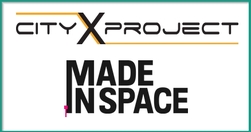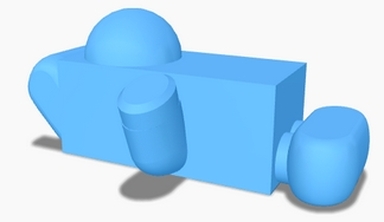to have an object manufactured off of Earth

The City X Project, now an open education resource available as a free download for teachers that has been downloaded over 700 times in over 50 countries, is a story-based curriculum in which students must solve challenges faced by the citizens of City X, the first human settlement on another planet. Each student is given a citizen card, which includes a cartoon citizen that presents a social issue to the student. James was paired with citizen Miguel, a boy representing issues of health care and accessibility to medical treatment in City X.
James invented a medical rollercoaster that he calls the Health Coaster. The patient sits inside, where a special device will administer whatever medical treatment is needed, while getting their feet massaged – “Because going to the doctor is stressful,” says James – and with a convenient control level that doubles as a storage device full of M&Ms candy. “In case you get hungry,” he adds. The whole apparatus sits on a rollercoaster track, “Because rollercoasters are more fun than going to the doctor.”
“We loved the story of City X, specifically the part about space travel” says Jason Dunn, co-founder of Made In Space, “and we’re very excited to help make the ideas behind City X real. 3D printing is going to change space exploration forever, and today’s kids can and should be a part of that.”
Both IDEAco and Made In Space are members of Singularity University Labs, a Mountain View-based startup program for organizations using exponential technologies to positively impact the world.
“I never would have guessed when the City X team came in that one of my student’s would have something he designed made in space,” said Lisa Ross, James’ 3rd grade teacher last year. “James has been waiting a long time for this to happen. He’s very excited!”
3D printed copies of James’ model will be on display at the Smithsonian Cooper-Hewitt Museum in New York City later this fall, as well as at a special exhibit sponsored by the Chicago Design Museum in Chicago. There will also be a local exhibition in James’ hometown of Appleton, Wisconsin.
More Information
IDEAco
ideaco.org | cityxproject.com
IDEAco, or the Coalition for Innovative Development, Education, and Action, is a global nonprofit on a mission to build and empower communities of Changemakers through experiential learning. Our programs combine design thinking and exponential technologies as tools for social innovation. We empower individuals and their communities to create change. We partner with organizations around the world to bring our programs to life, including Singularity University, the Pearson Foundation, Made in Space, and 3D Systems.
Made in Space
madeinspace.us
Founded in 2010 with the goal of enabling humanity’s future in space, Made In Space, Inc. has developed additive manufacturing technology for use in zero-gravity. By constructing hardware that can build what is needed in space, as opposed to launching it from Earth, the company plans to accelerate and broaden space development while also providing unprecedented access for people on Earth to use in-space capabilities.
Made In Space’s team consists of successful entrepreneurs, experienced space experts and key 3D printing developers. With over 30,000+ hours of 3D printing technology testing, and 400+ parabolas of microgravity test flights, Made In Space’s experience and expertise with regard to 3D printing in zero-gravity is unmatched, and has led to the first 3D printers designed for use on the International Space Station.













